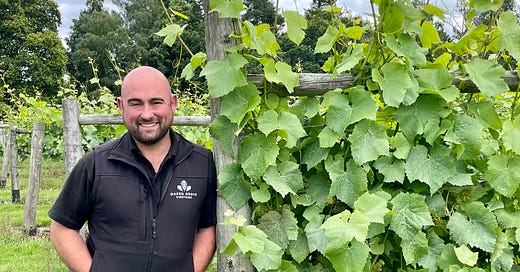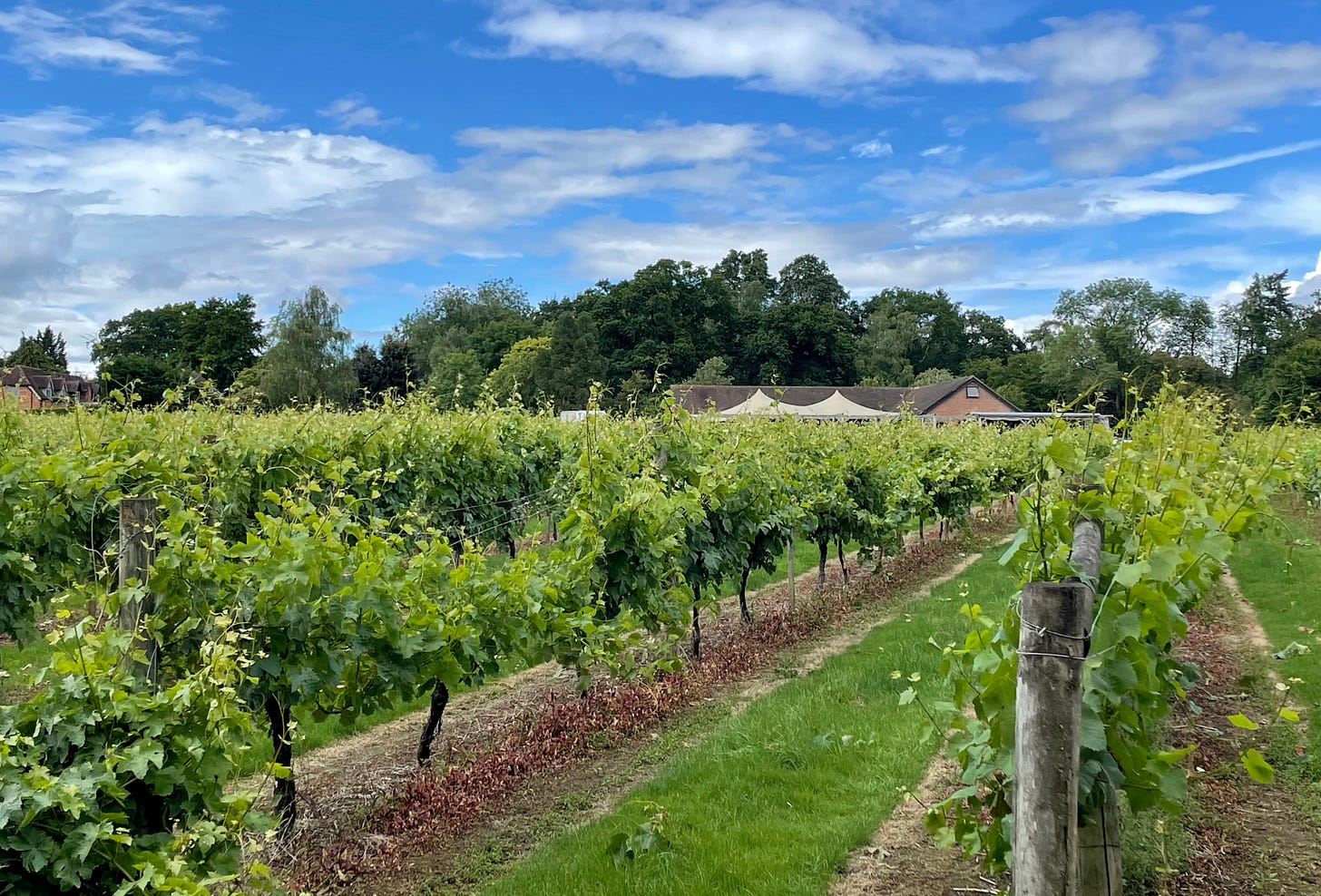My kingdom for a Time Machine
Phil Rossi and his wife Leena run Oaken Grove Vineyard in the tiny hamlet of Fawley near Henley-on-Thames in the Chiltern Hills. Phil got the bug early, planting vines at the tender age of eight.
English wine has long been the butt of jokes, but in 2023 the national yield doubled from 12 million to 22 million bottles. Consumers are buying. Oaken Grove Vineyard is a busy part of this growing market, producing typically 15,000 bottles, with a huge amount of effort and skill going into each and every bottle. The stakes are high, so are the skills and a degree of armour plating needed to thrive in this sector.
This is the fourth in my new series of interviews with business owners who are innovating and making a difference to the local visitor economy and their customers. They inspire me and I hope they will you.
Meet Phil, owner and producer at Oaken Grove Vineyard
Sometimes looking at things from far away can put a new perspective on life, like when you look through the wrong end of a telescope, what you are looking at appears to be at a great distance, instead of up close and in the expected confusing detail.
Oaken Grove Vineyard was established in 1986 across seven acres of Pinot Noir, Bacchus and Madeleine Angevine vines on the piece of land once used to grow apples and pears in South Oxfordshire. Carrying on the family business, Phil planted his first vine aged eight. Now his Oaken Grove Dry White is on the shelves of Waitrose food shops in Berkshire, Oxfordshire and Buckinghamshire. But it took a trip to the other end of the world to work and study viticulture on his uncle’s vineyard in Tasmania to ‘fix’ this career choice as it was there he took an interest in the “New World vs Old World’ wines…and in those days, old world wines looked down their collective noses at the upstart so-called New World. Even Australia looked down their collective noses at their smaller neighbour, Tasmania. 30 years later, the situation looks very different. Phil has played a key role in this, also holding down a full time job whilst developing and crafting products that are attracting attention and adding variety to the UK wine industry. Although he has felt like he has never had enough time to do any of this.
Pluck, crush, cork
English wine making has a long history, starting with the Romans and an unknown number of vineyards on the sunny slopes, fast forward to around 40 vineyards recorded in the Doomsday Book - what did that wine taste like I wonder? In the Medieval era, it was the monasteries who were brewing beer and pressing grapes. Over the next centuries, England looked to France to fulfil their British virtue of heavy drinking! “Throughout all this, the basics haven’t really changed” Phil says, “it’s in the production and marketing that continues to see innovation and technology. Get the basics right, before investing in expensive machinery, satellite tracking or marketing.”
If you want to make a small fortune, start with a large one
Much is made of the term terrior which dates back to the ancient Greeks who were a dab hand at winemaking. In essence, it means a sense of place because what lies beneath the vines, the climate and elevation determines what goes into the bottles. Oaken Grove has clay loam, flint and of course that seam of chalk that links this region to the mighty Champagne-Ardenne. Because of this and climate change, well resourced business owners including the French champagne houses of Taittinger and Pomerary are buying vineyards in southern England to take advantage of a warmer, wetter climate. With deep pockets, and a reliance on new tech, they are able to invest in a thriving domestic wine industry and will bring stiff competition to the much smaller vineyards. But Phil has what they don’t: a love, deep knowledge and appreciation of the Chiltern Hills and a desire to keep as close as he can to the growing and production of his wine.
What makes it all worth it?
Phil’s first call is to his wife Leena and young family: “It’s impossible to do any of this without them” he says, “and as my family grows, I can share my passion and spend more time with them here at the vineyard. It won’t be long before they’ll be telling me how use technology for the business to grow and become more sustainable.”
Whether on a farmstay, farm tour, vineyard tasting, or hands-on cooking class, farmers, wine makers and families turn their business into destinations by opening their doors to visitors to inform, share and experience the rural economy.
“When customers are enjoying themselves, it makes it all highs and lows worthwhile. A cliche you might say, but it’s true!” I have been on a busy tasting tour with Phil’s customers, some of them have travelled from all over the world and have come to spend the day in the countryside enjoying good food and wine. When they arrive, I expect most of them have no idea where they are as they tumble out of their cars and taxi’s having travelling along the narrow, winding country lanes from Henley. It can be disorientating, this rush of countryside, but in the hands of his welcoming team, the experience begins. Phil speaks warmly of them as they enable him to be in the place he loves, creating new tastes whilst sharing his heritage and knowledge, watching the seasons that may bring pests and mildew. But most important of all is being sure to have his grape pressing date secured in the calendar. It’s all very hands on.
Give me a time machine
“Who hasn’t experienced a time when things haven’t gone the way you planned or expected? It can have an ongoing negative effect on our health and those around us” he explains that this has been a big challenge for him, not least of all leaving employment and opening his tours and tastings in 2020 - early Covid. “Learn from it. Trust your gut and do what needs to be done, or what is in your gift to do to make that change and then move on. Or sometimes, step away.”
There is a delicate balance to be struck between the vines and the tastings, the events, live music and the limited number of weddings his business model allows. But it’s this secondary income that pays the bills and requires his hands-on management time which means less time amongst the vines. “Give me a time machine” he says, “so I can spend more time in the vineyard”.
We are all very close to our businesses aren’t we, doing so much to see it through to happy customers who recommend and return. Sometimes a step back is a good thing, provided you have the support and trust of those around you who can help prioritise. And give you a break!
Thank you Phil, for all the time I took from your busy day which sadly can’t give back! But I will be back to enjoy more of your fizz. You should too!
All content and images are copyright of Mary Tebje and may not be reproduced without permission.
If you enjoyed this post, please share and give it a ❤️
Links you will need
Book an Oaken Grove Vineyard tour and a tasting with Phil and his team here:
Volunteering beats machines every time because it brings people together and out into the countryside. And it’s great fun. I highly recommend you sign up with Daws Hill Vineyard or Oaken Grove Vineyard to help bring in the autumn harvest.
Can you recommend a business owner to be profiled here? Someone who is quietly getting on and making positive changes to our industry? Get in touch.
My popular Power-Hours are available to iron out any marketing comms wrinkles, having another pair of eyes on your website and socials. Get in touch in the usual way.
Be ‘in the know’ and surprise and delight your customers with what’s local and special across the region. Subscribe to my weekly Micro Travels with Mary newsletter to share with your customers. Sponsorship opportunities are also available if you have something special you wish to promote.






